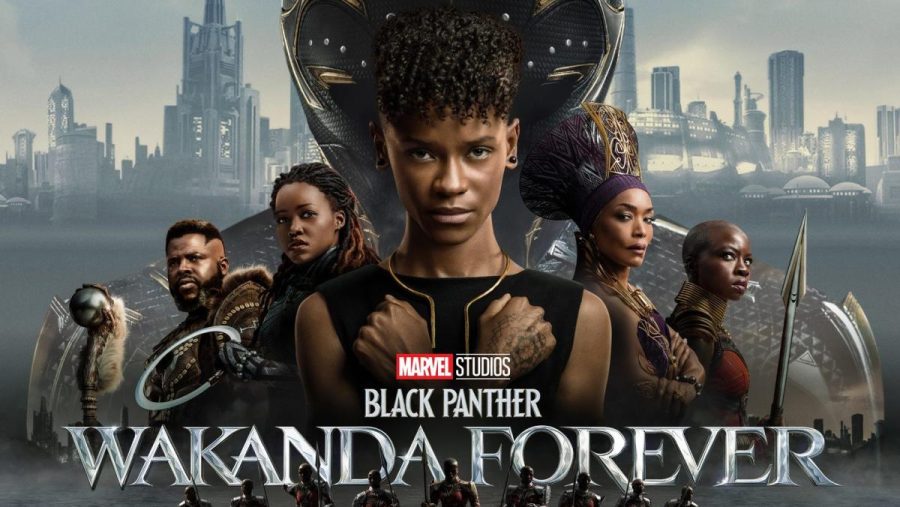Black Panther: Wakanda Forever Tackles Colonialism, Expands on Complicated Historical Narratives
Photo Courtesy of Marvel Studios
(Left to right) Winston Duke, Lupita Nyong’o, Letitia Wright, Angela Bassett, and Danai Gurira pose in character for Black Panther: Wakanda Forever.
It has been four years since Black Panther first appeared on the big screen. The week it came out, I remember going multiple times, and each time, I would stay until the last credits rolled. Black Panther gave me a sense of pride that I didn’t know could exist. Even today, I carry it with me, from the songs still being at the top of my Spotify on-repeat playlist to screaming “Wakanda Forever” at my sister before throwing something at her. So, it is no surprise that I rushed to the theaters for its sequel. I even had the opportunity to go with my community, as ABUSUA, the Black student union on campus, had worked with La Alianza Latinx to rent out the Apollo Theatre on premiere night. I sat riveted through the entire film as its show-stopping cinematography, stellar acting, and moving score left almost nothing to be desired. Unlike the first movie, however, I was unsettled when the credits began and unsatisfied as I left the theater. But why? On all accounts, it really was an amazing film, but I couldn’t help but feel like the true villain was still out there, and the real conflict was left unresolved. I wasn’t thinking about Namor. I was thinking about the people who started the entire conflict in the first place — the Western powers trying to steal vibranium.
The movie opens with France being caught trying to steal vibranium from Wakanda. It then shows the U.S. trying to do the same thing and failing only because Namor and other members of the underwater civilization of Talokan intervene. The movie then reveals the main conflict as the Talokanil and Wakandans battle over how to handle the theft of vibranium and how to deal with outsiders trying to take their resources. On all accounts, there was a conflict and resolution in the movie. The Talokanil and Wakandans fight, and in the end, they find themselves in a reluctant truce, choosing to cease fighting rather than cause more bloodshed. Why, then, did it feel like everyone still lost? The true villain was never brought to justice. Two of the strongest nations in the world fought against each other without realizing until the end of the movie that in starting a war with each other, they would both lose. The real victors were the Western powers who were trying to steal their resources in the first place. If anything, the movie left both Wakanda and Talokan in a more fragile state than before. The most unsettling part about this, though, was that it felt so familiar.
Historically, Western powers have maintained their dominance by taking their unentitled share of others’ resources. Take France, for example. For almost a century and a half, France oversaw a substantial colonial empire in Africa and siphoned resources from territories including present-day Senegal, Mali, Burkina Faso, Benin, Guinea, Ivory Coast, Algeria, and Niger. These countries only achieved independence in 1960. That was the year my grandma turned 19 — the same age I am now. Where does that leave those countries in the modern day? They are free, but not without the repercussions of colonialism. Now, many of those countries are struggling both economically and politically. For example, Algeria is still dealing with the repercussions of French occupation, the effects of guerrilla warfare, and the fallout of war crimes stemming from the Algerian War of Independence. Just last year, France ruled against issuing an official apology for its part in colonial violence in Algeria. The villain gets away with it.
In Black Panther: Wakanda Forever, the good thing is that our heroes have a decent amount of power. Vibranium is a resource that Western powers haven’t taken. It is left in the hands of the Wakandans and the Talokanil. In the film, you can see the greed of the Western powers and the lengths they’ll go to have those resources for themselves. However, the movie doesn’t make that the main focus, and I don’t know how I feel about that.
On the one hand, I disagree with Namor. Although I understand why there was a conflict between him and the Wakandans, he wanted to take over the entirety of civilization alongside Wakanda. He believed that they should rule as the strongest nations in the world, but conquering the conquerors wouldn’t have solved anything. However, I can’t fully disagree with his first point of stopping the exploitation of resources by any means necessary. I would never condone violence, but leaving resources with the potential for military use in the hands of countries with histories of colonial violence would be disastrous. Black Panther: Wakanda Forever had me questioning what decision I would have made in the position of the people of Wakanda and made me even more frustrated because we don’t see any progress in the movie made on addressing the theft of vibranium. Once the fighting stops, the movie leaves only time to grieve and process the battle itself, not its cause. The only insight we get is Namor revealing he intends to fight Western powers anyway; he knows that it will be only a matter of time before one country crosses a line, and both Wakanda and Talokan will have to act.
Black Panther: Wakanda Forever was terrific. It left me thinking not just about the film but about the actual issues of the real world. That is a credit to every actor and member of the cast and crew who put on a performance that moved me once again and taught me more about myself, my culture, and who I am in this world. I carry this film with me, differently than the first, but just as strongly. I recommend — no, I urge you to see this film. It speaks the very real truth about the world and colonialism. So watch it and ask yourself what the film is trying to say.








